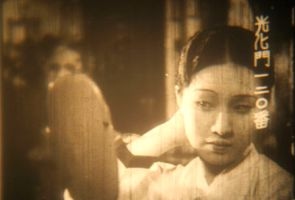Sweet Dream (1936) 45 min
Dir. Yang Ju-nam
Cast: Mun Ye-bong, Yu Seon-ok, Lee Geum-ryong
Madame Freedom (1956) 124 min
Dir. Han Hyung-mo
Cast: Park Am, Kim Jeong-rim, No Gyeong-hui
Sweet Dream
 Sweet Dream is "the oldest film in existence, and a valuable window into 1930s film grammar, as well as into discourses on New Women and modernity during the Japanese colonial era" (KOFA). The film tells a story of Ae-soon (Mun Ye-bong), a middle-class housewife in Seoul who is excessively vain and neglectful of her duties as a homemaker. She leaves her husband and their daughter to take up with her lover in a hotel. The movie was released sometime after Henrik Ibsen's A Doll's House debuted in Japanese-occupied Korea, when debates about "New Women" were particularly rife. The movie also provides an opportunity to glimpse Mun, who was the most popular actress of the 1930s and later the greatest actress in North Korea.
Sweet Dream is "the oldest film in existence, and a valuable window into 1930s film grammar, as well as into discourses on New Women and modernity during the Japanese colonial era" (KOFA). The film tells a story of Ae-soon (Mun Ye-bong), a middle-class housewife in Seoul who is excessively vain and neglectful of her duties as a homemaker. She leaves her husband and their daughter to take up with her lover in a hotel. The movie was released sometime after Henrik Ibsen's A Doll's House debuted in Japanese-occupied Korea, when debates about "New Women" were particularly rife. The movie also provides an opportunity to glimpse Mun, who was the most popular actress of the 1930s and later the greatest actress in North Korea.
Madame Freedom
 Set in the post-Korean war Seoul, Madame Freedom was a huge box-office hit and it played a crucial role in developing Korean cinema in the 1950s. Based on a newspaper serial novel of the same title, it dismantled Korean society with its story of a freedom-loving, married college professor who dates and dances with other guys. Often described as the most important Korean film of the 1950s, Madame Freedom is your rare chance to see how postwar Seoul, however momentarily, faced women’s sexual freedom outside the home and how it linked to American consumer culture after the armistice of the devastating War.
Set in the post-Korean war Seoul, Madame Freedom was a huge box-office hit and it played a crucial role in developing Korean cinema in the 1950s. Based on a newspaper serial novel of the same title, it dismantled Korean society with its story of a freedom-loving, married college professor who dates and dances with other guys. Often described as the most important Korean film of the 1950s, Madame Freedom is your rare chance to see how postwar Seoul, however momentarily, faced women’s sexual freedom outside the home and how it linked to American consumer culture after the armistice of the devastating War.

